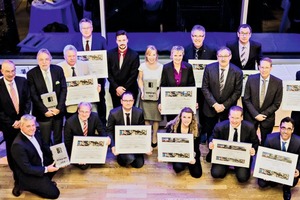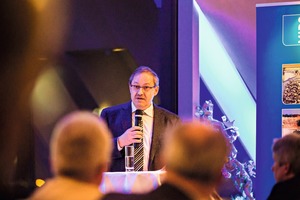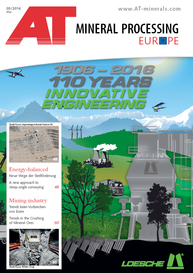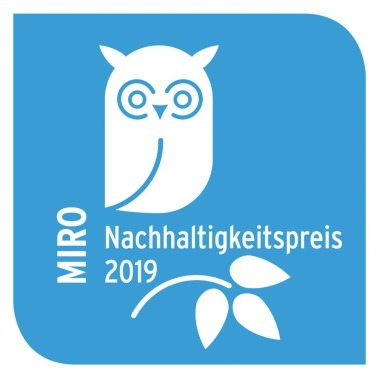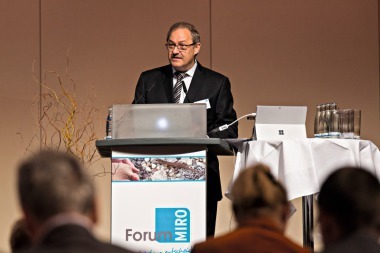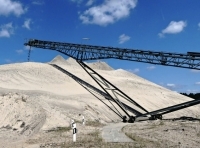Above-average commitment for sustainability acknowledged
Depicting and proving sustainability in exemplary appearances was the challenge of the current MIRO Sustainability Competition 2015/2016 of the German aggregates industry, which was held for the sixth time. Besides the basic sustainability categories of environment, social issues and economy, participants could choose between seven subcategories and submit their applications. All projects stood out from the already high standard of the industry’s mandatory legal requirements by individual specifics. Altogether 19 high-quality competition entries were submitted by 15 companies. On March 2, 2016 the award winners of this international competition were honored in a festive ceremony in the Cologne Chocolate Museum (Fig. 1).
In his welcoming speech, MIRO President Dr. Gerd Hagenguth (Fig. 2) explained the purpose of this special award for social, ecological and economic action in accordance with the sustainability principle in the aggregates industry: “Now, with this sixth competition, we want to demonstrate to politics, authorities and a wider public that our traditional industry operates in a highly innovative way. We create natural habitats with biodiversity, where once cultural landscapes resulted in impoverishment, and with complete raw material and waste recycling, we take account of resource efficiency. We, as representatives of a stationary industry, offer safe and family-friendly workplaces in mostly economically underdeveloped regions, and our predominantly medium-sized enterprises invest in land, pay their taxes and contribute considerably to industrial value creation. On behalf of all those who would have merited being mentioned here we honor companies that - with their application - made the effort to document the importance of sustainability in their work beyond the normal legal requirements.”
MIRO directly forwards the award winners’ projects of the current competition to the “Sustainability Award 2016” held by the European Aggregates Association UEPG. The award ceremony will take place in Brussels on November 16, 2016. As it has already been the case with the previous national MIRO Sustainability Competition, a brochure for the currently completed competition will be compiled at the instigation of the Bundesverband Mineralische Rohstoffe, in which the submitted projects of 2015/2016 are presented in word and pictures. The printed version will be available from May 2016 and can be requested at $(LEmailto:. Moreover, it will be made available as pdf-version on the MIRO download page.
Award Winners and Projects
Ecology
The first prize in the category “Environment“ went to the LZR Lenz-Ziegler-Reifenscheid GmbH for the project themed “Conversion of fruit orchards into a nature protection area through sand and gravel extraction”. Particularly appreciated was the ambitious aim of creating a meadow landscape in the area of former deserted orchards. The planned meadow landscape is intended to create significant synergy effects in the field of flood protection, water protection and nature conversation. In addition, the project includes environmental education measures. This project impressively proves that raw material extraction and effective environmental protection come along with a revaluation of ecosystems and can result in a win-win-situation for all parties involved.
The second prize in the same category went to the Zapfwerke GmbH & Co. KG for the project: “Enhancement of biodiversity through quartz sand extraction in the Kreuzstein surface mine”. A special renaturation method has been developed in the sand pit utilized since the year 2000. The areas temporarily stressed by the extraction of raw materials, which took place in smallest operation sections, will be renaturalized in a timely manner and by using measures that go far beyond the legal requirements. Already after 15 years of sand extraction, all succession stages, from raw soil to the climax community “forest”, could be developed, which made this unique succession in the natural sand region a great success. With the company’s commitment, the previously specious-poor pine forest became a complex with remarkably high structural diversity both in terms of habitats and biocenosis - while sand extraction took place in parallel. The monitoring initiated by Zapf provides impressive evidence of the enhanced biodiversity.
Social Issues
The first prize in the category „Social Issues - Subcategory Local Partnership“, was awarded to the Quarzwerke Frechen GmbH for the project “NaSa-scientists discover the quartz mine in Frechen“. This social long-term project for young natural scientists uses a hands-on approach to introduce the topics of sand extraction and exploitation to children while implementing nature conservation, environmental protection and the protection of species in an exemplary way. The regular free-of-charge offer for elementary school classes also includes children of refugees as well as children with mental disabilities. Besides the playful knowledge transfer, the NaSa-researchers will also acquire craftsmanship. The project is supported by partners, such as the NABU, in particular by the German Youth Association for the Protection of Nature and the Cologne PUB (an association for the public and biotechnology).
The project “Holyday camps in the open air” by the Röhrig Granit GmbH secured the second place. For one week every two years, children aged between 8 and 13 are attended to and catered during their holidays, while experiencing up close and personal the quarry as habitat and economic area. The camp offerings, very popular in this region, are differently themed – in 2016 the motto will be “The Middle Ages”. Inspired by this general topic, “learning” will be linked with “craftsmanship” and “fun”. Besides the company staff, also employees of Hessen Forst, NABU, educators, mineralogists and archaeologists work in the care team.
Economy
Since the participants of the competition category Economy had applied in two different subcategories, the jury could award two first prizes in this segment.
The first prize in the category “Added value for society” went to the Aqua Solar Village Kalkar of the Maas-Roeloffs GmbH & Co. KG. With a floating plus energy building, the company made an impressive contribution to the sustainable use of waters after gravel extraction. The house, which uses the quarry pond as an energy source, is currently available as a pilot project for research and congress purposes. Later on, in the medium term, a complete aqua solar village is planned on the water and on the banks of the pond with zero-energy third-party supply.
In the category of “Best Technology/Product Innovations”, the Hermann Trollius GmbH secured the top position. The company trod unconventional paths of using their previous production residues. The washing suspensions from limestone and dolomite preparation have been flushed away to sedimentation ponds for many years. As Hermann Trollius couldn’t find a technical possibility for the reasonable recovery and utilization of the deposited small sediments he became an inventor himself. He interdisciplinarily pooled knowledge from agriculture, waste water treatment technology, manufacturing of construction machines and pump technology and, in cooperation with a construction equipment manufacturer, combined it to an innovative solution. The ultrafine particles, drained with the help of the so far unique technology, are now being used for odor absorption of liquid manure. Under the name of “Dolomin”, they are a valuable fertilizer which is very popular with farmers.
Besides its cost effectiveness, the project captivates by its efficient approach to recycle extracted raw materials to 100 %.
Special awards in the categories of Biodiversity and Public Relations
In addition, the jury granted three special awards for particularly remarkable achievements, which were hard to categorize, but nevertheless deserved a prize.
Another project of the Röhrig Granit GmbH, which was focused on biodiversity and its verification, was honored with a special award. For this purpose, the company established the constant and long-term monitoring of indicator species by nature conservation experts in the habitat of the quarry. The populations of birds, bats, amphibians and reptiles as well as selected groups of insects have been recorded for about 15 years using external expertise. The monitoring agreement between Röhrig Granit and the state-run ornithological station was the first of its kind in the aggregate industry. After initial suspicion of the trade, the brave approach has already inspired others. Meanwhile, the practical application has proven to provide a win-win-situation to both companies and species protection.
With their cross-media approach of highly-modern digital and classical print-based means of communication with most different stakeholder and age groups, the Heidelberger Sand- und Kies GmbH, with the parent company Heidelberg Cement AG, secured the special award in the category of Public Relations. A clearly designed homepage smartly linked with a YouTube channel provides bio-ecological information in the form of pictures, texts and short films. This promising way of aggressively presenting the sustainability aspects of extraction and post-utilization activities at the extraction sites of the company in favor of the biodiversity is accompanied by an appealing series of non-fiction books, a postcard series and other information materials for different user interests.
Special award for lived sustainability
The Hoffmann Mineral GmbH has been extracting silica for already 112 years. For more than 50 years, i.e. through generations, the company has been providing recultivation that serves as a standard. In this regard, they have been falling back on the expertise of conservationists for more than three decades. Wandering biotopes have become an integral part of the planning. Mine tours for the interested public have been complemented by offerings for young people, children and parents as well as by the establishment of a silica adventure path. The employees profit from a wide range of education and training programs as well as from different additional benefits and support measures in the context of an additional collective agreement. The exemplary character has already been confirmed by other awards, among them the quality seal “Amphibian-friendly Business”, the environmental award of the City of Neuburg and the “Green Angel”, awarded by the Bavarian Ministry of the Environment.

